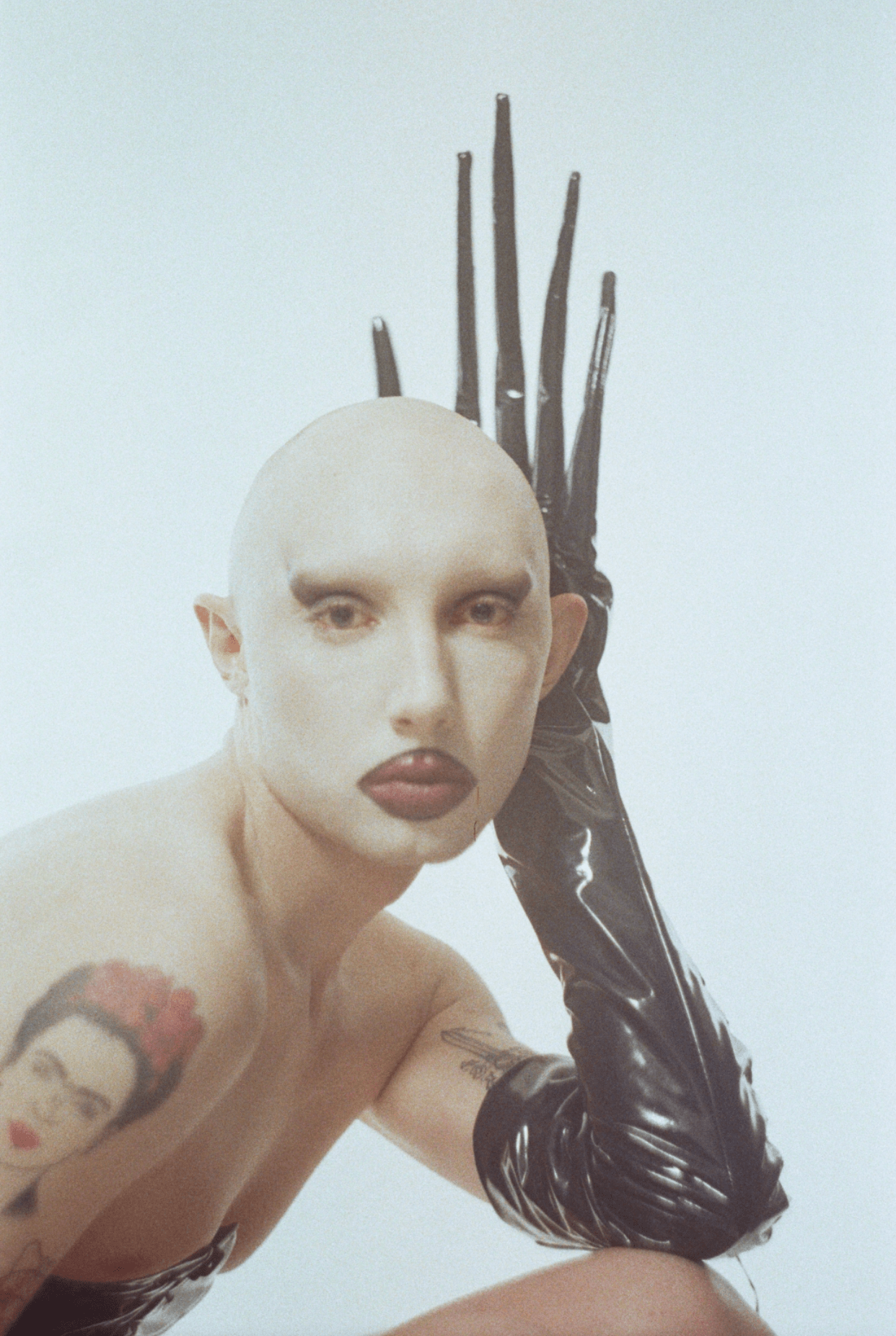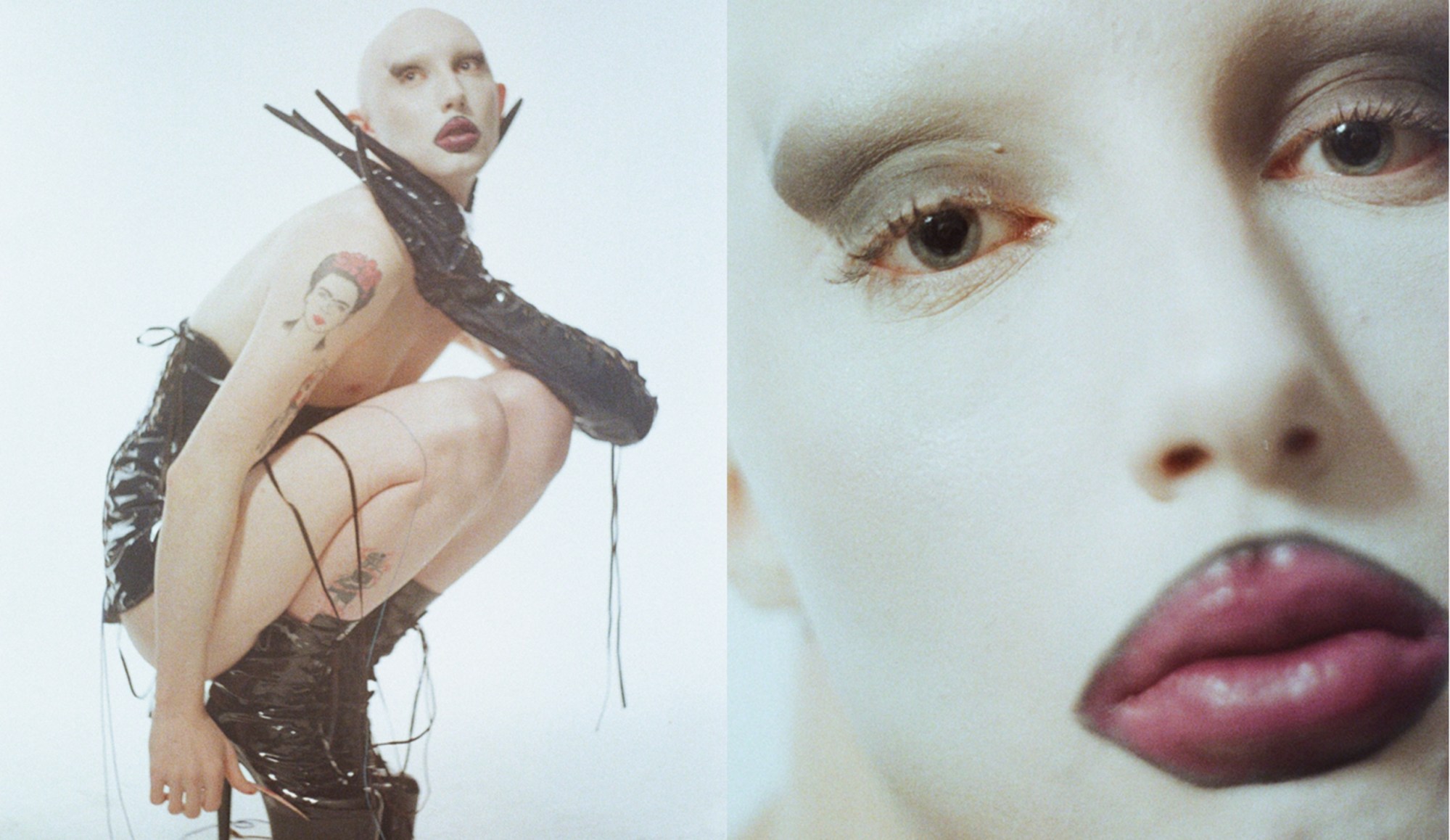In the Far East region of Russia, some 10,000 kilometres away from Moscow lies Magadan, one of the biggest former gulag camps, perched on the frozen shores of the Sea of Okhotsk. Its surroundings are desolate, barren and without a hint of colour. It’s a city where there are few options: you either become a fisherman or work in one of its other heavy industries.
Hailing from this icy, remote outpost is Gena Marvin, a 21-year-old non-binary drag performer, who against all odds, has managed to navigate and escape the harsh realities of her hometown. “Everything in Magadan is grey: its people, the city, life,” Gena explains. “But I always knew there was this colourful energy inside me ready to burst out.”
Raised by her grandparents, who looked after her following the death of her parents, there was little room for being ‘different’, and there certainly wasn’t any form of creative encouragement. Coming out as queer at an early age, her grandfather, fighting the realisation that his grandchild would never conform to the ‘normal’ standard, tried to get her to settle down, join the military or follow his footsteps in the fishing industry. Aspiring to none of that, Gena found refuge in icons like Leigh Bowery and Amanda Lepore, as well as performance art, using social media platforms to share her own DIY post-apocalyptic looks. “I’ve always been inspired by performers who gave their body to their art,” she explains. With no more than gaffer tape, junk, vertiginous high heels, pitch black contact lenses and a signature shaved head, Gena manages to transform into an extraterrestrial, avant-garde creature.

Mesmerised by Gena’s artistry, Russian director Agniia Galdanova decided to make a documentary film focussing on her life and performance art. Titled Queendom, the film — which previewed last week at London’s ICA, with a director Q&A hosted by Emma Corrin — offers a beautiful but at times gut-wrenching glimpse into Gena’s inner world and overt acts of resistance. “I was looking to create a series about drag artists across Russia and heard about a drag queen from Magadan,” Agniia tells i-D. “That combination was very unusual. Magadan is the last place in Russia where I would imagine drag existed. When I met Gena, I knew I didn’t need other protagonists. Gena is the most free person I have ever met coming from such an unfree place.”
As the LFF and CPH:DOX award-winning film showcases, Gena’s world is built on the foundations of fear and anger. Russia is a strictly heteronormative society, where traditionally defined gender roles are considered a societal value. Any deviation from those norms, or the unapologetic celebration of one’s identity, is met with grave repercussions. “It all starts when you’re a child: the mockery, the bullying,” Gena tells us. “When you come of age, however, you become an open target — it’s a free pass for harassment.”
What fuelled Russia’s societal attitude is a 2013 federal ban on the distribution of “propaganda about nontraditional sexual relationships” to minors, known colloquially as the “gay propaganda law”. It prohibited expressions of LGBTQ+ identity in Russia that could be viewed or heard by children. This law was further updated in November 2022, transforming what was previously an audience age restriction into a total ban on expressions of LGBTQ identity, and updated again just last week to declare LGBTQ activism an “extremist movement”. This has resulted in a surge of violence against gender-nonconforming people in Russia, reinforcing the already historically marginalised position of the community.
Against this relentless backdrop, Gena’s performance art has taken on a more activist stance. Upon relocating to Moscow, she enrolled in a local makeup school, discovering a pocket of like-minded individuals — a sanctuary shielded from the harsh realities of the outside world. “It’s in the spaces of school, our homes or the clubs, where we manage to find queer joy,” Gena says. “The costumes, the heels, the makeup: it’s like armour to us. It makes us feel invincible. We love dressing up, going out and walking into the sunset when there’s no-one around to harass us.”
The effects of Putin’s anti-LGBTQ policies, however, are omnipresent: from friends in the queer community experiencing violent attacks, to microagressions and homophobic slurs being thrown at her on a daily basis. This has only encouraged Gena to push her artistic boundaries even further, taking an active stance against the oppressive government. “I felt the need to emerge out of the seclusion of clubs, into the public space to make a statement. Russia was starting to feel like a place where the walls were closing in on me, and I needed to break out”, she explains.
A 2021 protest demanding the freedom of opposition leader Alexei Navalny — who had been detained upon returning to Russia after being sent to Germany, for treatment following his poisoning the previous year — turned out to be a catalyst moment for Gena. Wrapped tightly in tricolour duct tape, like the national flag of the Russian Federation, she took to the streets. The resulting performance is captured in Queendom, marking a pivotal moment for both Gena and the film. Surrounded by thousands of indignant people, the tension is palpable and viewers are left in awe of the amount of courage it takes to publicly stand up against Putin’s regime, where flag desecration alone is punishable under Russian law by imprisonment for up to a year. “It was incredibly scary to do, and afterwards when I rushed home, I wanted to peel off the duct tape as fast as I could — the tape felt like a symbol of Russia, suffocating me.”
Instead of being deterred, however, she felt more fired up than ever, and more political performances followed. Then, on 24 February 2022, Russia launched the aggressive full-scale invasion of Ukraine. Gena found it impossible to remain silent, recognising the necessity to express her dissent through a public art performance. Wrapping her semi-naked body in barbed wire, she marched the streets of Moscow in the freezing cold. “I felt like Russia had these walls with barbed wire around it, preventing people from escaping, so I decided to wear it as a symbol”, she says, referring to the country’s oppressive nature — and the victims that bleed for it.

“Whether it was liberating or not, I knew a clash with law enforcement was inevitable. But it was all part of it,” Gena says. Sure enough, the protest-performance led to her arrest. “We took some preventative measures before going outside,” Agniia adds. “We specifically left Gena’s wrists uncovered so the police wouldn’t hurt themselves. If they did, it would result in another criminal case against us. Our cinematographer was on roller skates so he could escape from the police with the footage. When Gena got arrested, I did everything to get arrested as well to be in the same van with her. That was the agreement among ourselves – staying together no matter what.”
But no-one, including Agniia, could predict what would ensue post-arrest. It was clear that Gena had to escape Russia — both out of fear of prosecution and of forced conscription to the army, which, as she notes in the film, “would be the end of me”. To great relief, she managed to seek asylum in Paris, a city that couldn’t present a starker contrast to the one she escaped from. Here, far away from her friends and family — whom she accepts she might never be reunited with — Gena now has the time and space to reflect on how her life changed overnight. “I’ve always felt out of place where I grew up. Here, everything makes sense. You can go out in a dress or a skirt, no one notices. I’m normal here.”
As Queendom paints so tenderly, being an activist comes with a heavy price and the social frontline can be an isolating place. As such, the film makes a strong plea for protecting people in those places where being different poses a threat. It also shows that the harder an oppressive regime may try to eradicate queer joy and self expression, the harder the community will bounce back.
‘Queendom’ is showing at select UK and Irish cinemas now.
Credits
Photography Nicolas Lado

